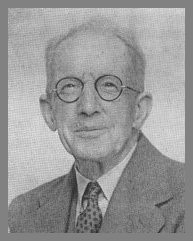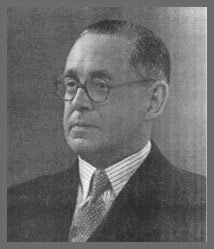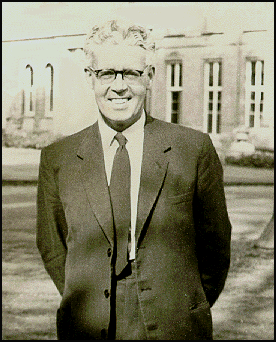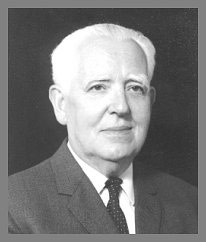![]()
Mr. A. (Andy) Rowan
Mr. A.G.
("Scriv") Scrivens
Mr. E.F. (Ted) Marshall
Mr. R.A. (Bob) Williams

Every now and again there arrives in the education field a man who becomes for his own and later generations a Mr. Chips. When he arrives he is the product of personal gifts and character and also of sociological influences which are so arranged as to make his coming inevitable.
In the Shoreditch story such a man is Andrew Rowan. His personal gifts are known to more than a thousand men almost all of whom went into the teaching service and some of whom have joined him in retirement. That so many of these men have sent their sons to be trained for the same service in the same college is a tribute to the work and influence of this man.
The College is now (1953, JRW) a constituent college of the University of London Institute of Education and while retaining its beloved name it has gone to the glorious setting at Cooper's Hill where a new chapter in its history has recently been opened. Its pride in its origins is recorded in the new 1953-1954 Handbook of the Institute of Education as follows:- Shoreditch Training College grew out of a movement which started in 1902 when a Pupil Teacher Centre was established at Orange Street School in Southwark, to train men for the experiment in education concerned with manual training. Shoreditch men add to this impersonal statement the two names of Andrew Rowan and James Boorman - the pioneers at Orange Street and the officers in charge of the work when it was translated to Pitfield Street, Shoreditch. Mr. Rowan was our chief from 1902 to 1937 when he retired. He has been in our thinking ever since, and the impact of his forceful personality, his fiercely held ideals, and his tremendous energy were known to all those who had the privilege of working with and under him during these years.
Andrew Rowan was a man of character, a lowland Scot from Creetown, Kirkcudbrightshire, who true to tradition came south to offer to the more benighted parts of the kingdom his gifts and inspiration as a dominie; "Andy" was a character - as much a character as the beloved Mr. Chips. Stories about him are shared whenever Shoreditch men meet. They radiate out from that sacred little cubicle in Room 10 - the Circle Room - where from 1919 a generation of men came to keep appointments, to hear straight truths, to receive testimonials, or merely to ask the great man for some favour. Some of these stories are recounted at dinners and other public occasions; others - perhaps more apocryphal - are passed round in smaller groups when men of some particular year foregather. Two such have recently been noted in the Senior Common Room of the College.
A certain Mr. Morgan, still in the Oxford Group and not a very successful student, had a gift of mimicry and entertained his fellows by walking into a room with the little mincing steps familiar to us all. The head bobbed just a little, and in the raised left hand was a pair of glasses used to punctuate a point before being transferred to the nose. On one occasion in the common room from a door at one end came the impersonator while from the door at the opposite end of the room there came the original. Neither saw the other until they were almost face to face. Each stopped and the first to move was the original who turned on his heel and went out. There is no sequel to the story as far as is known.
A second story records that aspect of Andy's enthusiasm which led him to be oblivious to the passage of time when with his ‘lads'. A certain restive class in about the year 1924-5 had had a long spell of mathematics and the time was well after 5 in the afternoon. The restiveness was noted and the mathematics led on to a moral disquisition - as it always did and perhaps should - and the analysis led on to a discussion of the question of gambling. This startled the class for a ringleader was at that moment surreptitiously running a sweepstake calling for bets as to the exact minute past 5 when the halt should be called to the lesson.
This was but one aspect of a very live and many-sided character. Some of us saw him at Thundersley when for a solid month he became our father at the summer camp and we got to know him so intimately. Some remember the great end-of-term concerts when he doubled up with laughter at himself as caricatured by the students. Many of us remember his kindly fierceness in those long sessions at the end of a criticism lesson or his unwillingness to bind himself to a timetable for the session or for an hour's fixture, or to the subject matter of a lesson which almost always flowed over until it encompassed problems of conduct, government and of life itself.
To few of us is it given to create something as enduring as a school or college community; to still fewer comes the challenge to build such a work without a plan of campaign or even suitable materials. Andrew Rowan succeeded in such a sphere and men of Shoreditch will always remember and be grateful. [pub. Bulletin No. 26, November 1953 "Picture Gallery" -- author unknown]

My earliest recollections of Shoreditch date back to a period before the 1914-18 War when, along with nine other boys and accompanied by our parents, we sat in what was called the lecture theatre in the old building in Pitfield Street. The ten of us had been awarded a scholarship entitling us to be trained as pupil teachers of handicraft. I can remember sitting there looking at the wonderful configurations of the pitch-pine panels forming the front of the long demonstration bench, and listening for the footsteps of Shadrach Hicks, the stately Principal of that day who had asked us to be present to learn about the place and its work. Eventually, accompanied by Mr. Rowan, he arrived complete with top hat, which he sedately placed on the table before him. The impression he created was tremendous with his Pickwickian appearance, his rounded speech and its amazing fluency. This was my introduction to Shoreditch and it proved to be the same setting in which Mr. Scrivens was welcomed by the student body some years later, when in 1919 a group of some 43 men came back to be the first men to be enrolled as students in the newly recognised Shoreditch Training College. I was in that group one morning in the same lecture theatre when once again the stately tread of the dignified Shad Hicks was heard, accompanied this time by a youngish man whom he proceeded to introduce to us as the new English man. Shad's beaming face indicated that he was well satisfied with his choice since he benevolently surveyed him and us in his best majestic manner. So began Mr. Scrivens' association with Shoreditch, which has spanned a period of 35 years, nearly half of which he has spent as Principal of the College.
Arthur George Scrivens is the man about whom I have the privilege to write. But who knows him as such? Generations of men have affectionately dubbed him "Scriv" - and Scriv he will always remain to us. Is not this a measure of our esteem and affection for him and a symbol of the friendship and generosity of spirit which exists so closely between him and us? There are some people to whom is given the supreme gift of sympathy and understanding, to whom one can go for help or comfort, or to be reassured that all is not lost. Such a man was Scriv to generations of students - ever ready to help and console those who had suffered some loss or who needed help; with a pat on the back, or a handshake they would come away feeling the better able to resolve their troubles.
But let me not build up a picture of a man which would portray to those not knowing him that he is a softly spoken benevolent old gentleman going quietly about his work. There is a Puckishness about Scriv's make-up which results in an irresistible, irresponsible buoyancy of spirit which is liable to burst the bonds of decorum at any moment, whether on the platform or the quarter deck. They understand who have seen him push open the staff room door (and push is the operative word) and then assail those present with a quip or a wise-crack which keeps them busy holding their own in rapid cross talk.
How many times I have heard Scriv remark that he is a "cockney sparrow" and proud of it. Watch a London sparrow sometime, perky, alert, fast moving, friendly and yet ready to fight at any moment if need be, wanting to be with people - you will see how true this is. If you have been with Scriv in London when he is crossing a busy street, or weaving his way through the crowds on stairs and subways of the underground, you will see how much a part of this jet age he is. This boundless energy is reflected in all he does. Eager to get to grips with a problem and resolve it - hating delay and inefficiency. Scriv has never been able to suffer fools gladly.
Generations of students will recall those attractive English exercise sheets and notes, beautifully produced often in two colours, which were pulled off the old hectograph jelly in years past. These "dabs off the doings" are still to be found in the hands of old Shoreditch men. Times have changed but students of recent years must surely retain a picture of Scriv at his typewriter now "tapping out the doings" preparatory to duplicating the next edition of the sessional arrangements, memoranda, etc. These have been the means of ensuring that every detail of the work of the College has been planned and all made aware of their part in it. It is this thoroughness and attention to detail which has ensured the healthy state of the College today. The discipline which Scriv imposes on himself to deliver the goods at the right time - irrespective of the time and work involved is a measure of his seriousness of purpose and determination to see that nothing but the best must be good enough for Shoreditch. He knows better than most the weaknesses in the College work and life, and the weak links in its chain, and has always welcomed criticism so long as it has been constructive and not destructive. He conceives his job as still that of a schoolmaster and not an administrator, and as a schoolmaster he has dedicated himself to his work and his students. And being a schoolmaster he has great faith in his fellow creatures, ever ready to help and forgive rather than condemn and commit. This generosity of mind may annoy the critic, but as I have often heard Scriv remark "There but for the grace of God, go I." Could any other remark reflect greater charity and understanding of his fellow men?
Looking back over the years we realise now how fortunate the College was to emerge at all as an entity after the war. And even then it was to face another issue which would, in my mind, have settled the destiny of the College for all time. One of the anomalies which always existed was the fact that since the work of the College went on in the same building as the Shoreditch Technical Institute, there had always been two pieces of work going on side-by-side, necessitating a Head of the Technical Institute, and a Head of the Training College - both of whom were under the Principal of the Shoreditch Technical Institute as a whole. When the Acting Principal of the S.T.I. was appointed just after the war to another post, the mantle fell on Scriv's shoulders to act as Principal of both pieces of work. This was a testing time for any man - should he plump for the combined job with its implied status and its attractive salary scale - or should he use the occasion to scheme to separate both pieces of work? On this decision rested the future possible development of the College. It must be put on record for all time that Scriv made the choice and stood by the College. From that moment, for the first time in history, we were freed from the shackles of cabinet making and the Technical Institute, and the College was free to develop as an entity. We found new friends at the Ministry and old and new friends at County Hall. This achievement, combined with the tremendous faith which the Chairman of the Governors had in our work, ensured our future as a Handicraft College. All Shoreditch men should honour the name of Tommy Jones, the Chairman concerned, for the enormous amount of spadework he did on our behalf at County Hall, at a time when it was never needed more. But again I must emphasise that it was Scriv's loyalty to the College and his faith in its future which won us friends and made all future happenings possible. Cooper's Hill came into the picture in 1948 and became a reality for us in 1950. Scriv used to say "Give me three years at Cooper's Hill and we shall have re-established the traditions of the College in its new setting". His foresight has been amply justified.
I began with the story of Scriv's coming on the staff of the Teacher Training Department of the Shoreditch Technical Institute. I finish it at the point of Scriv leaving for his retirement as Principal of the Shoreditch Training College - a constituent college of the University of London Institute of Education. To have seen a new piece of work grow from a small Pupil Teacher Centre to the stature it is today, all within some fifty years in English education - despite two devastating world wars which consumed ten valuable years, and the inevitable post-war economy periods and world crises - is a wonderful and unique experience. Scriv can be more than justly proud of the fact that he has been destined to play his part in this first half century of our story over a period of 35 years. Be it remembered too that Scriv always pays full tribute to the work of his old chief Andy Rowan, who built and held the fort for so many years in such difficult circumstances.
We shall miss Scriv badly as he goes to join Shoreditch men in "that other Shoreditch over the border" - as Andy used to say. And may we not forget Mrs. Scrivens who for so many years has so graciously accepted the inevitable and given pride of place to Shoreditch. We wish them both God-speed and a long retirement when they go.
["Picture Gallery" - R.A. Williams]


Visitors to the Shoreditch Campus main building become familiar with one contribution that R.A. Williams made to the College as soon as they enter, but without knowing it. The oak panelling of the foyer was his attempt to put a Shoreditch stamp of craftsmanship upon a rather nondescript entrance hall. The whole of this great work was carried out by the students, ably managed by an enthusiastic lecturer staff, as a production project. The incised boards, contemporary with the panelling, were also initiated by him although carved professionally. A founder member of the College Club (now the Shoreditch Society), he made possible the realisation of the Club's dream - the commemoration of fellow students killed in the two world wars - by eliciting support from members to provide timber for the making of a Memorial Lectern upon which were carved the names of all those who had fallen in the two world wars. The lectern was made by a distinguished student as his Final Job (Special Exercise).
R.A. Williams, formerly Head of Woodwork, later Head of Handicraft and finally, Principal of Shoreditch College, who died in 1983, was a figure of immense importance in the growth and development of the College. As a past President of the Society wrote in an obituary, his career took a course which few of us, if any, could hope to emulate today; ranging, as it did, from pupil teacher to Training College Principal.
In an autobiographical piece published in the Shoreditch College Club Bulletin of 1964 celebrating the College Jubilee he recounts his earliest association with the College in 1914. "It was early in that year that I walked down Pitfield Street with a drawing board and tee square under my arm looking for the Shoreditch Technical Institute where I was due to sit for one of the ten scholarships offered in London". (These were for admission to the London Authority as a pupil teacher). The 1914-18 war interrupted his studies and when he returned in 1919, it was to a newly instituted Training College. All students of the inaugural year were ex-service men and most became leading figures in the teaching world.
He goes on to tell us how the early days of Handicraft were confused by the equivocal position of the handicraft teacher; teachers in the school workshop only, not allowed into the classroom, they rarely appeared in the staff room, and were never candidates for promotion to headship. The inception of Shoreditch as a recognised Training College put a legal end to such discrimination but many years of dedicated work were required before the legal change became a commonly accepted reality.
In promoting the long-term metamorphosis of ‘Handicraft Instructor' into teacher specialising in handicraft, R.A. Williams was a tireless and persuasive advocate. Even before the move from London to Coopers Hill in 1950 he was active in initiating schemes to open out the then narrow craft programme to new fields. The first Supplementary courses of one year for advanced students provided the opportunity, it was able to include student directed projects in boat building, wheelwright's work, sports equipment making etc. Inspired by all this novel activity in woodwork, the Metalwork section - under the aegis of F.H. Giles - introduced foundry work which was employed in the making of the movement of a Newtonian Telescope, the 6 inch mirror of which was ground and polished on a machine designed and made by the students.
These innovations were followed by his early advocacy of the merits of the ‘integrated craft' programme, this was seen first as linking wood and metal as in pattern making and casting. Later, as Deputy Principal, he was in a strong position to influence College policy and he used this to urge the introduction of subjects into the curriculum ancillary to handicraft, although he was always touchingly anxious to make sure that these newly introduced ‘second subjects' entertained no subversive ideas of becoming ‘first' subjects, or in any event did not lose the essential practicality of the craft approach.
The second subjects, nevertheless, blossomed and became a valuable liberalising influence on the College. They were highly valued in the schools and ultimately proved to be important constituent subjects in the London University Institute of Education B.Ed., degree in Handicraft and Education for which as Chairman of the Institute Handicraft Committee he wrote the initial proposal. In order to present the College on a wider stage he promoted, in conjunction with the Crafts Council of Great Britain, a great exhibition of Shoreditch work in Design and Craft Education. This was held in the Haymarket, a prestigious place in the Capital for the work of student teachers.
He designed and drew out the plans for the
workshop buildings at Coopers Hill and personally directed the
transfer of resources to the new area without losing teaching
time. He was an early member of the Schools Film Society, a pioneer
in visual education and from 1946 onwards made a number of films
on craft procedures to assist this expanding field of education.
In 1966 the Governing Body elected to give him the signal honour
of calling the last lecture hall to be built on the College site,
'Williams Hall'. His life was bound up with the progress of the
subject and the institution, any account of Shoreditch College
or of Handicraft, in London or in the world at large, must inevitably
include him as a major figure.
Home | History | Staff | Photos | Lost Touch? | News | Links | Contact | Site Map
Copyright © 1998-2007 John Williams and Jill Sandwell